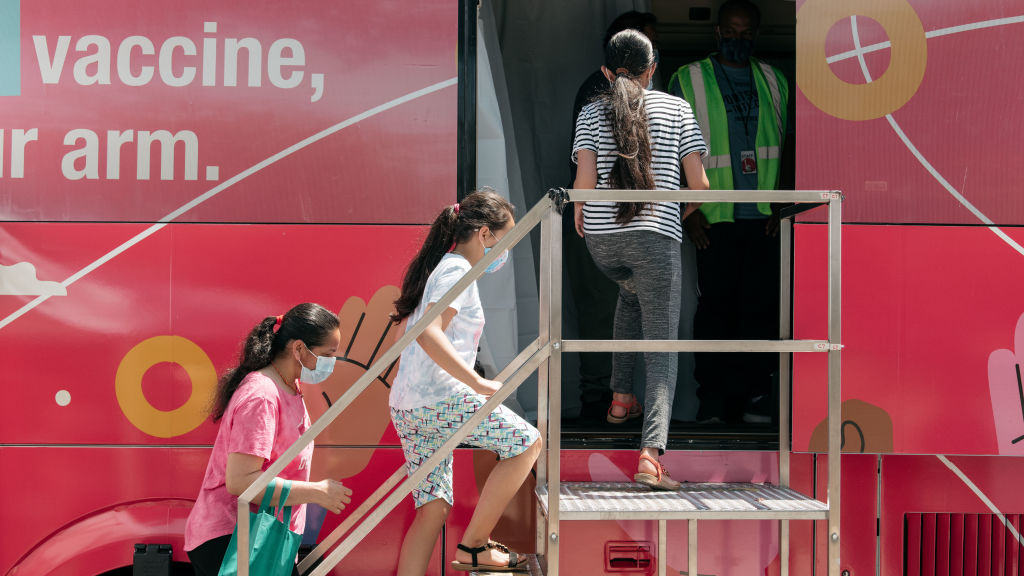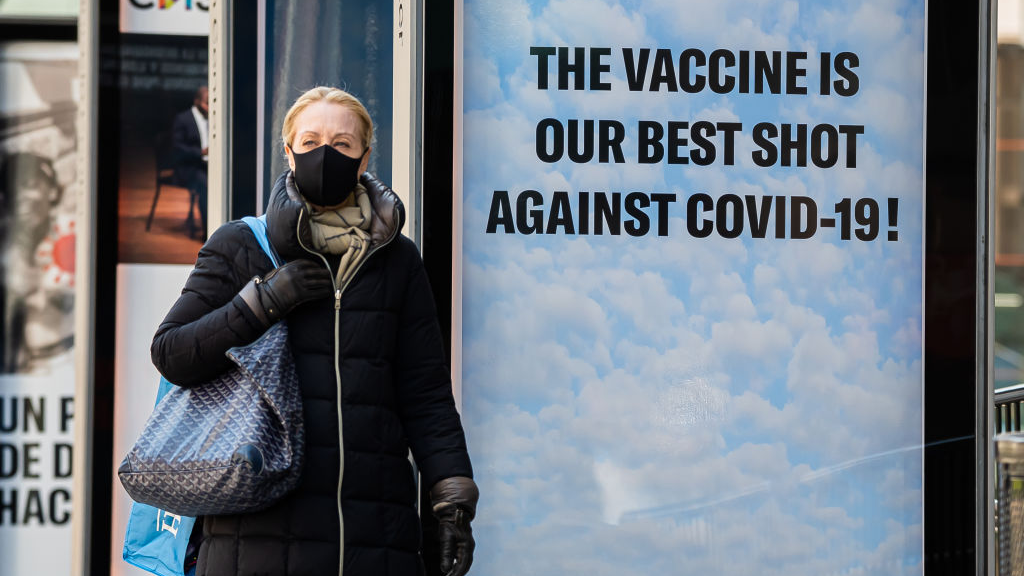
A family enters a pop-up COVID-19 vaccination site in the Jackson Heights neighborhood in the Queens borough in New York City, U.S., June 5, 2021. /Getty
A family enters a pop-up COVID-19 vaccination site in the Jackson Heights neighborhood in the Queens borough in New York City, U.S., June 5, 2021. /Getty
Editor's note: Haider Rifaat is a Features Writer for OK! Pakistan, an international edition of OK! Magazine. He is also a writer for Arabian Moda and South China Morning Post and serves as the creator and host of Pakistan's first web talk show – The Haider Rifaat Show. The article reflects the author's views and not necessarily those of CGTN.
Delta, a highly transmissible variant of the virus that causes COVID-19, is rapidly gripping parts of the United States, and it appears as if the administration of President Joe Biden is doing very little to curtail its spread. Joe Biden assured in a statement he made more than a week ago that the new variant would not set any lockdowns in motion, however, "some areas would be very hurt."
His words come across as tone deaf given that it is only wiser to enact lockdowns in the wake of a full-blown, contagious wave approaching America. Delta accounts for 20 percent of the total coronavirus cases emerging in the U.S. alone. It is 60 percent more transmissible than the Alpha variant discovered earlier on in the United Kingdom.
The variant also has a version of its own, known as Delta Plus, which has been detected so far in India, the UK and the United States. Additionally, more than 85 countries have reported cases of the Delta variant – sending shockwaves across the world. Tedros Adhanom Ghebreyesus, director-general of the World Health Organization, stated last week that Delta "is spreading rapidly among unvaccinated populations."
More recently, the Wall Street Journal reported that nearly half of Israeli adults administered with the U.S. vaccine from Pfizer contracted COVID-19 amid the Delta outbreak. This eventually led the Israeli government to reenact the indoor mask requirement.
Health officials in Israel stated earlier that 90 percent of the new coronavirus infections in the country can be attributed to the Delta variant. Even countries like Australia, New Zealand, Portugal and Bangladesh are mulling lockdown orders in the wake of coronavirus cases rising in parts of the world due to the Delta variant.
The U.S. government hoped for a swifter COVID-19 recovery, but the national health crisis is far from over. At present, returning to normalcy is a far-fetched reality for Americans given the rapid increase of the Delta virus in the country. Its spread has a doubling time of about two weeks, according to Dr. Anthony Fauci, director of the National Institute of Allergy and Infectious Diseases. Fauci dubs the highly transmissible variant as the "greatest threat" to the U.S. in its fight against COVID-19.

A person walks by a sign that reads, "The vaccine is our best shot against COVID-19" on the Upper West Side amid the coronavirus pandemic in New York City, U.S., March 30, 2021. /Getty
A person walks by a sign that reads, "The vaccine is our best shot against COVID-19" on the Upper West Side amid the coronavirus pandemic in New York City, U.S., March 30, 2021. /Getty
So far, 323 million vaccines have been administered in the U.S., according to Bloomberg analytics. Just last week, 748,399 vaccine doses were administered in a day. However, what is important to consider here is the ineffectiveness of the U.S. manufactured Pfizer vaccine against the Delta variant, particularly in Israel.
A case study as alarming as this should send shockwaves in America, considering that millions have been immunized with Pfizer, and one in five new cases in the U.S. are of the Delta variant.
However, there are conflicting accounts about the effectiveness of Pfizer in defending individuals against the Delta variant. While PHE figures indicate that two doses of Pfizer and AstraZeneca are 96 and 92 percent effective against the Delta variant, the experience in Israel tells otherwise. Contradictory accounts like these present more questions and stir up further confusion.
The Biden-Harris administration is met with its biggest COVID-19 challenge yet; incentivizing unvaccinated Americans to get the jab while grappling with the Delta variant moving forward. The faster unvaccinated individuals receive their vaccines, the steadier the COVID-19 situation would be. However, that does not seem to be the case in America at present.
Many U.S. states, primarily Mississippi, South Carolina, Virginia, Tennessee and Georgia, are trailing behind required vaccination targets. Even those residing in rural and Republican-led regions of the country are hesitant to get inoculated with COVID-19 vaccines, raising concerns of a possible surge in new cases. The Delta variant is bound to trigger infection rates in the coming weeks unless people choose to get vaccinated.
Vaccine hesitancy is a major challenge for the Biden government to come to terms with. According to African American Research Collaborative, 40 percent of Latinos, 41 percent of Blacks, 23 percent of AAPI, 40 percent of Native Americans and 37 percent of Whites reported vaccine hesitancy.
The big question here is: Can the Biden administration influence unvaccinated Americans to get vaccinated? Not being able to do so would likely worsen America's fight to overcome a national crisis.
(If you want to contribute and have specific expertise, please contact us at opinions@cgtn.com.)

